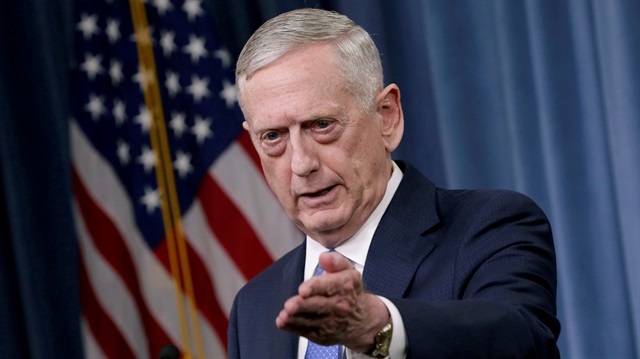
'We're making no changes to the exercise program at this time,' Defense Secretary James Mattis says
The American defense chief said Tuesday there are no considerations to suspend additional military drills with South Korea after U.S. President Donald Trump cancelled exercises planned for this summer.
Trump made the decision as a concession to North Korea amid U.S. efforts to denuclearize the Korean Peninsula, calling the drills "very provocative." But progress on denuclearization appears to have stalled -- a fact Trump acknowledged last week when he called off a planned trip by his top diplomat to North Korea.
Addressing reporters alongside Joint Chiefs Chairman Joseph Dunford at the Pentagon, Defense Secretary James Mattis said Washington has "no plans" to cancel further exercises.
"We will work very closely, as I said, with the Secretary of State, and what he needs done we will certainly do to reinforce his effort. But at this time, there is no discussion about further suspensions," Mattis said. "We're making no changes to the exercise program at this time."
Mattis said Trump's decision to cancel exercises planned for this summer was a "good faith" measure following the president's historic sit-down with North Korean leader Kim Jong-un in Singapore last June.
The U.S. has conducted military drills with South Korea since the 1950s and has roughly 28,000 troops stationed there.
Addressing concerns over the Saudi Arabian-led coalition's bombing campaign in Yemen, Mattis said U.S. support for the coalition is not unconditional, but voiced support for "Saudi Arabia's sovereign right to self-defense."
"We are also working closely with the coalition that is fighting to support the U.N.-recognized government in order to determine what went wrong with errant bombing attacks and prevent their recurrence," he said.
UN experts Tuesday said individuals in the Yemeni government and coalition forces conducted attacks in Yemen that may amount to war crimes.
Coalition airstrikes, according to the report, caused “most direct civilian casualties after hitting residential areas, markets, funerals, weddings, detention facilities, civilian boats, and medical facilities.”
About 6,660 civilians were killed and 10,563 injured in the Yemeni conflict since March 2015, the UN Human Rights Office said, warning real figures are likely to be “significantly higher."
One of the most grisly airstrikes took place Aug. 9 when two dozen children were killed in an attack on a school bus.
Mattis said continued U.S. support for the coalition is conditional on them doing "everything humanly possible to avoid any innocent loss of life, and they support the U.N.-brokered peace process."



